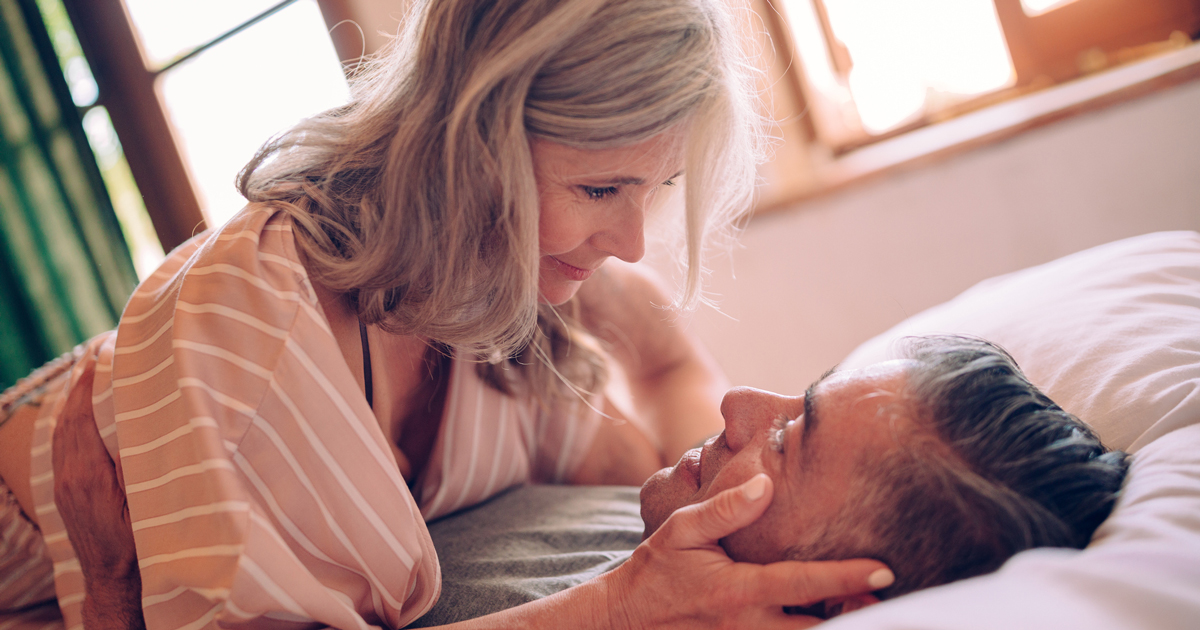How to have great sex during menopause and beyond

You can have an incredible, fulfilling sex life at any age. Menopause is a time of transition, so it's perfectly normal to notice some changes. Treatments are available for these types of sexual issues:
- Lower libido
- Vaginal dryness
- Bleeding during sex
- Birth control
- Peeing during sex
- Sexual changes due to medication
The Olson Center for Women's Health is dedicated to meeting all of your women's health needs. Our specialists are easy to talk to and can help you resolve physical issues that might be getting in the way of intimacy.
I'm a 56-year-old woman going through menopause. My sex drive is none! Do they make Viagra for women?
"It's very common for women to have a lower sex drive, or libido, during menopause," says OB-GYN Karen Carlson, MD. "You can increase your sex drive with lifestyle changes, including date nights, sex aids and lubricants."
Common menopausal symptoms caused by decreasing hormone levels are often to blame for a lower sex drive. Body discomfort or weight gain can take away your desire for sex. Hot flashes and night sweats can make you tired. Mood symptoms, including depression and irritability, can cause relationship turmoil. Each of these symptoms can make sex less enjoyable, leading to lower libido.
Ways to increase your sex drive:
- Reduce dryness with moisturizers (applied every two days) and lubricants (applied during intercourse)
- Talk with your partner about what you like
- Rest up. A recent study found that women who get enough sleep are much more likely to experience sexual interest or pleasure
- Schedule time for sex. Making a plan for sex gives you time to get in the mood
- Spend more time on foreplay
What do you recommend for extreme vaginal dryness and painful intercourse due to menopause? I have a hard time with creams and getting them applied properly and timely.
Creams can be messy, so it's good to know there are other options available. For example, a vaginal ring releases a low dose of estrogen over 90 days to treat dryness and loss of elasticity. Or, you might benefit from an estrogen tablet to insert into your vagina. Your OB-GYN can talk through these options and help you choose the best one for your situation.
Call 800.922.0000 to make an appointment with an experienced OB-GYN.
I'm 47 years old and have recently become sexually active again. Sometimes I will bleed during and after intercourse. There's no pain during or after. The bleeding stops later on. Should I get checked out?
If you're postmenopausal, friction against more sensitive skin might be the cause of the bleeding. But it could also be a side effect from a medication, polyps, a vaginal infection or something else. Any abnormal bleeding should be checked out. See your OB-GYN to figure out next steps.
When can I stop using birth control?
"I recommend using contraception until between the ages of 51 and 55 or until you become menopausal," says Carlson. "While pregnancies over age 45 are rare, they can come with increased risks for both the mother and baby."
Why do some women urinate during intercourse? I'm 60 years old.
Feeling extra pressure on the belly can cause peeing during sex. Changing your position might solve this. You can also try emptying your bladder before and after sex.
Urinary incontinence is very treatable. Treatments include behavioral changes, physical therapy and medications. Call 800.922.0000 to see a urogynecologist.
How common is sexual dysfunction as a side effect of an SSRI medication? How can I resolve this issue?
Unfortunately, SSRIs and other medications that treat depression can affect how you feel about sex. Our Reproductive Psychiatry team treats mood and anxiety disorders during times of hormonal transition. An appointment with an experienced psychiatrist can help you find the right type of treatment at 800.922.0000.






